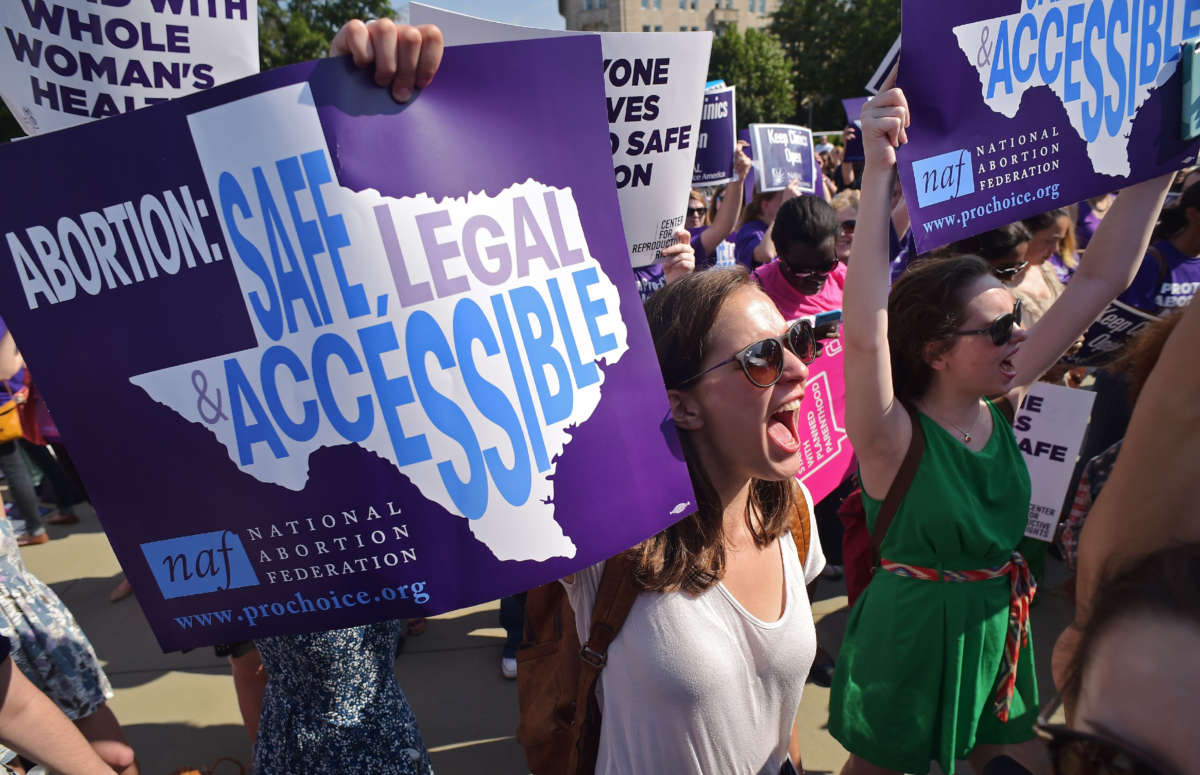A Republican lawmaker in Texas has introduced a bill that would make all abortions in the state illegal, with the punishment being the death penalty for anyone performing or undergoing the medical procedure.
Texas Republican State Rep. Bryan Slaton said in a press release that his bill would showcase how his party truly feels about the practice. “It’s time Republicans make it clear that we actually think Abortion is murder,” Slaton’s statement said. In a tweet about the proposal, Slaton also claimed the bill would “guarantee the equal protection of the laws to all Texans, no matter how small.”
Slaton’s bill, HB 3326, would charge any person who has an abortion, as well as any provider who performs the medical procedure, with assault or homicide. Those charges carry with them extreme punishments, including the death penalty in the state, and are in stark opposition to the stated “pro-life” positions anti-abortion activists say they hold.
The bill would ban all abortions from the point of fertilization, and would not make any exceptions for rape or incest, though it would allow the procedure when a pregnant person’s life is at risk. The bill would also grant immunity to any individual who gives evidence or testifies against a person whom they have helped in obtaining an abortion.
The official Twitter account of the Texas Democratic Party sent out a tweet blasting the proposal.
“Texas Republicans filed a bill to abolish and criminalize abortions — potentially leaving women and physicians who perform the procedure to face the death penalty,” it said. “The right to choose is a human right. Period.”
Abortion is a favorite topic for Slaton, a freshman legislator in Texas. He previously led an effort to try to halt any legislation in the state from moving forward — including the naming of roads and bridges — until the issue of abortion was addressed.
It’s unlikely that Slaton’s bill will advance very far, as previous legislative efforts with similar goals have failed in recent years. An anti-abortion bill in 2017 failed to receive any hearings at all, and in 2019 a similar bill died in committee after several hours of public input.
But the bill is representative of a series of other bills across the nation that are seeking to impose extreme limits on abortion, and it’s possible that his proposal could go beyond those other two bills. Fourteen states throughout the U.S. have seen Republican legislators propose similar plans to ban abortion outright. It is hoped by these lawmakers that enacting these laws will lead to lawsuits, which in turn could result in the U.S. Supreme Court taking them up, and possibly overturning the 1973 Roe v. Wade abortion rights decision.
Just this week, Arkansas Gov. Asa Hutchinson, a Republican, signed into law a bill that bans nearly all abortions in the state. In a statement regarding the new law, Hutchinson expressly stated that he hoped the law would be challenged.
The abortion ban “is in contradiction of binding precedents of the U.S. Supreme Court, but it is the intent of the legislation to set the stage for the Supreme Court overturning current case law,” Hutchinson said in a statement.
Jessica Mason Pieklo, executive editor at Rewire News Group, a reproductive rights-focused media organization, noted in a tweet that the American Civil Liberties Union of Arkansas was already planning to challenge it. But Pieklo also worried over how far legal challenges would advance, particularly within conservative-leaning federal courts.
“The question is what will the Trump judges on the 8th Circuit do and what [toll] will that take on patients and providers?” she asked in her tweet.
Within the Eighth Circuit Court of Appeals, 10 of the 11 active judges are appointees of Republican presidents, including George W. Bush and Donald Trump. As recently as December, the court ruled in ways that would allow Arkansas to enact other strict measures regarding abortion, including banning the practice after just 14 weeks of pregnancy.
Press freedom is under attack
As Trump cracks down on political speech, independent media is increasingly necessary.
Truthout produces reporting you won’t see in the mainstream: journalism from the frontlines of global conflict, interviews with grassroots movement leaders, high-quality legal analysis and more.
Our work is possible thanks to reader support. Help Truthout catalyze change and social justice — make a tax-deductible monthly or one-time donation today.
